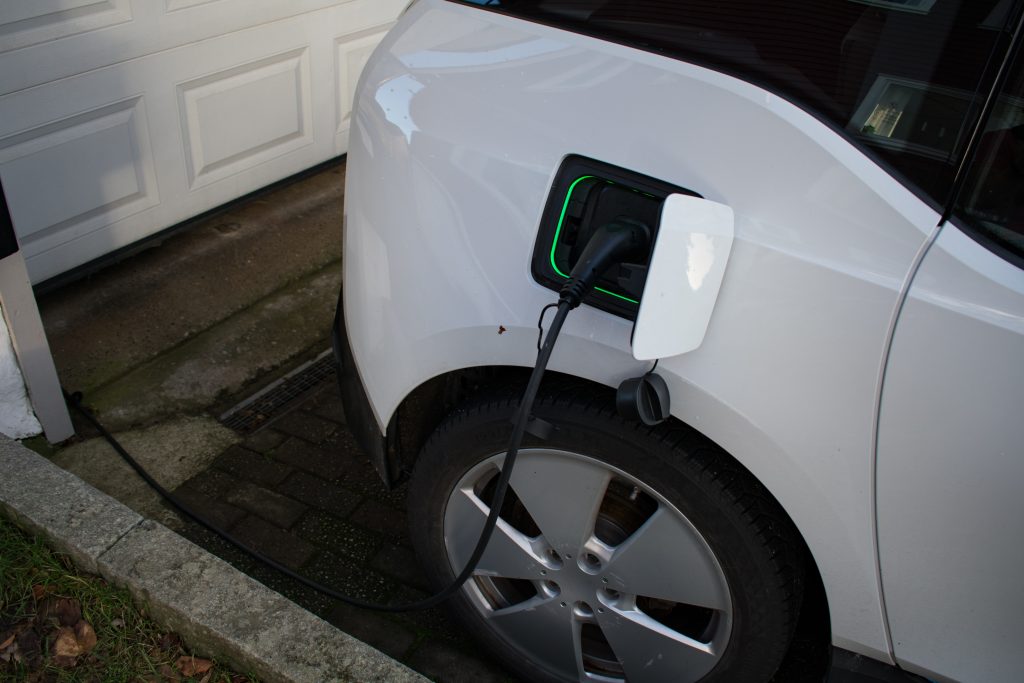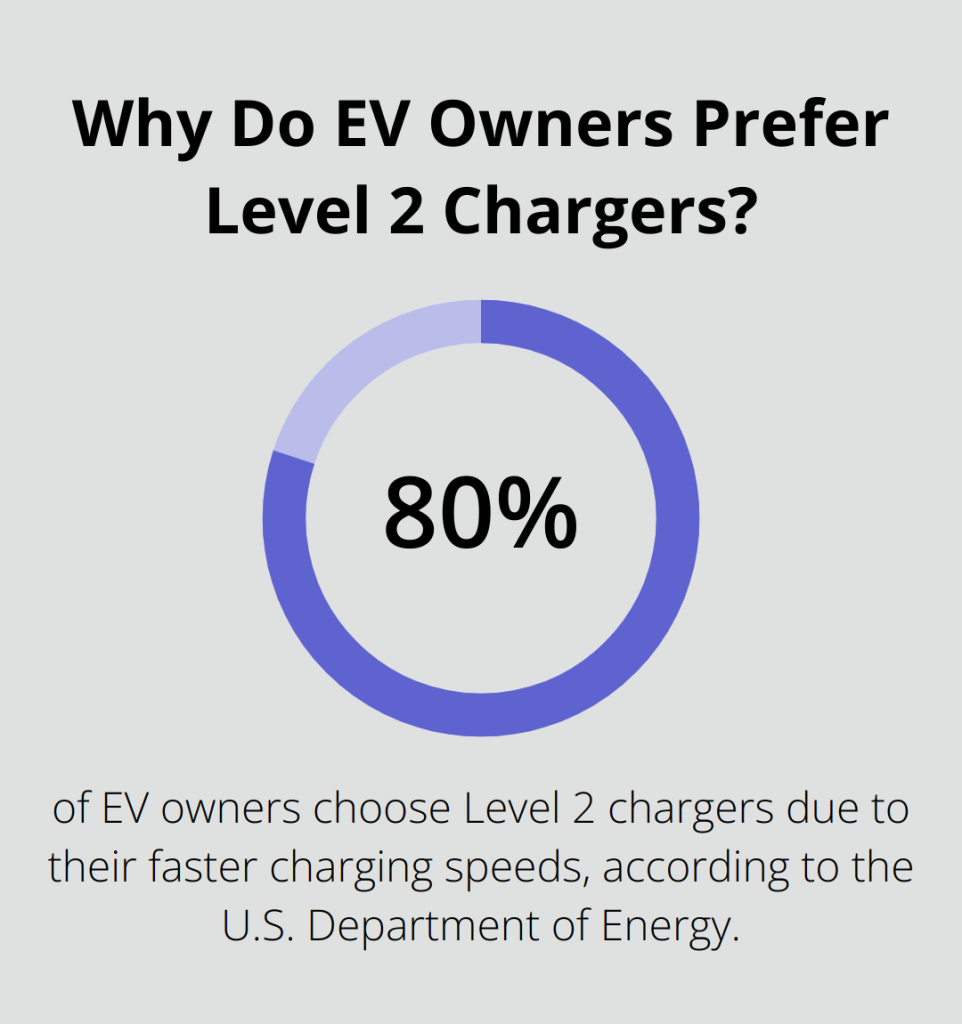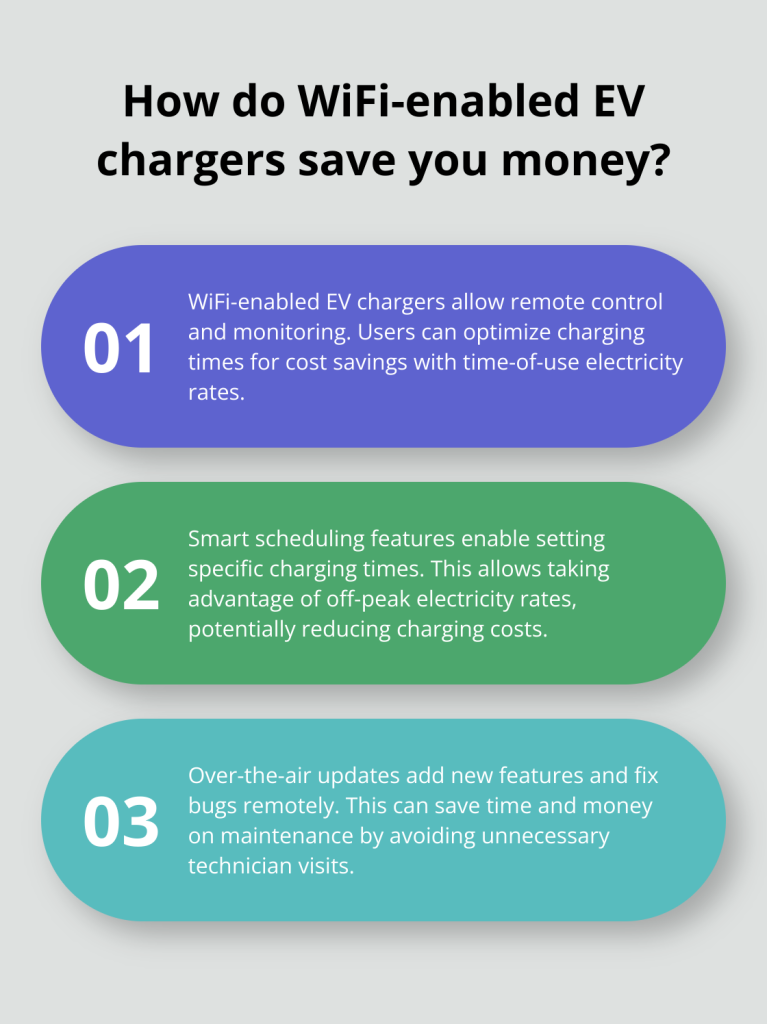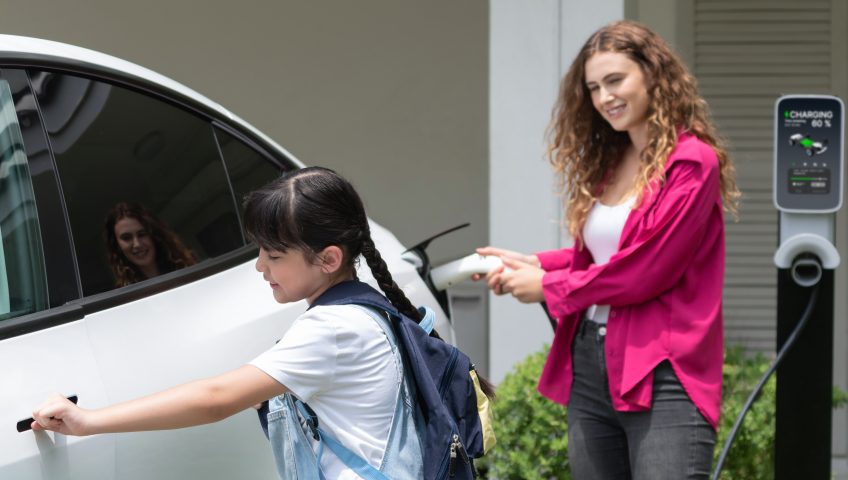At ROS Electric LLC, we often get asked: “Do home EV chargers need WiFi?” It’s a common question as more homeowners switch to electric vehicles. While WiFi connectivity can enhance the functionality of EV chargers, it’s not always necessary for basic charging. In this post, we’ll explore the role of WiFi in home EV chargers and help you decide if it’s a feature you need.

What Are EV Home Chargers?
Types of Home EV Chargers
EV home chargers are essential devices for electric vehicle owners. These chargers convert AC power from your home’s electrical system into DC power that your car’s battery can use. There are two main types of home chargers: Level 1 and Level 2.
Level 1 chargers plug into standard 120V household outlets. They add only about 4 miles of range per hour of charging. Level 2 chargers require a 240V outlet (similar to what your dryer uses) and can add an average of 32 miles of range per hour. The U.S. Department of Energy reports that over 80% of EV owners choose Level 2 chargers due to their faster charging speeds.

Key Components of EV Chargers
Every EV charger consists of a few key components:
- Main unit (houses the circuitry that controls power flow)
- Charging cable with a connector (plugs into your car)
- Display (either a built-in screen or indicator lights)
The Role of Connectivity
Modern EV chargers often come with WiFi or cellular connectivity. This allows for features like remote monitoring, scheduling, and over-the-air updates. A 2022 study by J.D. Power found that EV owners’ satisfaction with public charging stations was measured for both Level 2 charging stations and DC fast charger stations.
However, connectivity isn’t necessary for basic charging functionality. A non-connected charger will still charge your car effectively. The choice between a connected and non-connected charger often depends on personal preference and specific needs.
Choosing the Right Charger
When selecting an EV home charger, consider these factors:
- Charging speed requirements
- Your home’s electrical capacity
- Desired features (e.g., smart scheduling, energy monitoring)
- Budget constraints
ROS Electric LLC has extensive experience installing various types of EV chargers. Our experts can help you navigate these choices and find the perfect solution for your needs.
How WiFi Enhances EV Home Chargers
Remote Monitoring and Control
WiFi connectivity in EV home chargers introduces smart features that improve your charging experience. Through smartphone apps, you can start or stop charging, check the charging status, and receive notifications when your vehicle reaches full charge. This control proves particularly useful for those with time-of-use electricity rates, as it allows you to optimize charging times for cost savings.
Smart Scheduling and Energy Management
WiFi-enabled chargers offer smart scheduling features, which allow you to set specific charging times. This capability helps you take advantage of off-peak electricity rates. The U.S. Energy Information Administration provides electricity products, interactive data tools, and detailed data files that can help you understand and optimize your energy usage. You can potentially reduce your charging costs by scheduling your EV to charge during off-peak times.
Over-the-Air Updates and Diagnostics
WiFi-connected chargers can receive automatic software updates, which can remotely add new smart charging features, fix bugs, and allow for remote diagnostics. This capability ensures your charging station always has the latest features and security patches, potentially saving you time and money on maintenance. Manufacturers can often troubleshoot and sometimes resolve problems without requiring a technician visit if issues arise.
Alternatives to WiFi Connectivity
While WiFi remains a popular choice for connected EV chargers, it’s not the only option. Some chargers use cellular connections, which can provide more reliability in areas with poor WiFi coverage. Cellular-connected chargers typically require a data plan (which may add to the overall cost) but can offer more stable connectivity.

Ethernet connections present another alternative, offering a direct, wired connection to your home network. This option can provide faster and more stable connectivity than WiFi but may require additional installation work to run an Ethernet cable to your charger location.
It’s important to note that while these smart features offer convenience, they don’t affect the primary function of charging your EV. Non-connected chargers will still charge your vehicle effectively just without the added features.
Can EV Chargers Work Without WiFi?
Basic Charging Functionality
EV chargers do not require WiFi for their primary function. These non-connected or “dumb” chargers provide a straightforward charging experience. Users plug in their vehicle, and the charger supplies power until the battery is full or the user manually stops the process. A 2023 J.D. Power study found that owners of newer EV models are less satisfied with their home charging speed compared to owners of older models, highlighting the importance of reliable home charging solutions (regardless of connectivity features).
Limitations of Non-Connected Chargers
Non-connected chargers lack certain conveniences offered by WiFi-enabled models. Without connectivity, users cannot access features such as:
- Remote monitoring
- Smart scheduling
- Over-the-air updates
This means users must manually start and stop charging sessions and cannot automatically take advantage of off-peak electricity rates.
Scenarios for WiFi-Free Chargers
Several situations exist where a non-connected charger might be the ideal choice:
- Poor Internet Coverage: In locations with weak or unreliable WiFi signals, a non-connected charger ensures uninterrupted charging.
- Simplicity Preference: Some users prefer a plug-and-charge solution without app management or additional features.
- Cost Considerations: Non-connected chargers often cost less than their smart counterparts, offering a budget-friendly option.
- Privacy Concerns: For those worried about data privacy, non-connected chargers do not transmit information about charging habits or energy usage.
Installation Requirements
Proper electrical setup is essential when installing a non-connected charger. We recommend professional assessment of a home’s electrical capacity and installation of a dedicated circuit for the EV charger. This ensures safe and efficient charging, regardless of WiFi connectivity.
The latest 50-amp home chargers require a dedicated 70-amp circuit. Adherence to these standards is vital for the safety and longevity of the charging setup.

Find the Perfect EV Charging Solution with ROS Electric
Do EV home chargers need WiFi? It depends on your needs. WiFi-enabled chargers offer features like remote monitoring, but basic chargers provide reliable, simple plug-and-charge functionality. At ROS Electric LLC, we can help you choose and install the best option for your home, ensuring a smooth EV charging experience. Contact us today to get started!


Write a Comment